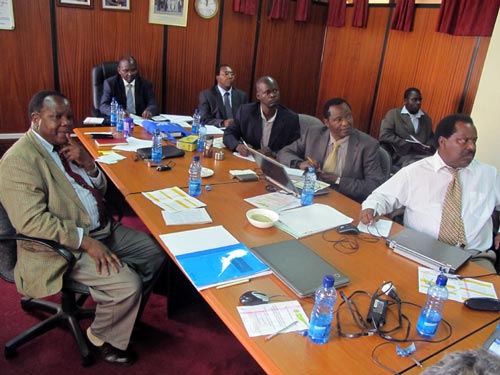 The Kenya Annual Review and Planning Meeting (ARPM) was held during 5-6 November 2012 at the Kenya Agricultural Research Institute (KARI). The meeting was attended by 33 participants from the Queensland Alliance for Agriculture and Food Innovation (QAAFI), KARI, Ministry of Agriculture, Agriculture Research Council (ARC-SA), International Crops Research Institute for the Semi-Arid Tropics (ICRISAT), Association for Strengthening Agricultural Research in Eastern and Central Africa (ASARECA), Royal Tropical Institute, Resource Projects Kenya (local NGO), and FRESHCO Seeds (local private seed company). Present were also Stephen Njoka (KARI-Embu) and Francis Muyekho (KARI-Kakamega), who chaired some of the sessions.
The Kenya Annual Review and Planning Meeting (ARPM) was held during 5-6 November 2012 at the Kenya Agricultural Research Institute (KARI). The meeting was attended by 33 participants from the Queensland Alliance for Agriculture and Food Innovation (QAAFI), KARI, Ministry of Agriculture, Agriculture Research Council (ARC-SA), International Crops Research Institute for the Semi-Arid Tropics (ICRISAT), Association for Strengthening Agricultural Research in Eastern and Central Africa (ASARECA), Royal Tropical Institute, Resource Projects Kenya (local NGO), and FRESHCO Seeds (local private seed company). Present were also Stephen Njoka (KARI-Embu) and Francis Muyekho (KARI-Kakamega), who chaired some of the sessions.
Joseph Mureithi, KARI deputy director and SIMLESA program steering committee member for Kenya, welcomed all participants and informed them on the adoption of a new value chain innovation platform, bringing major stakeholders on board to address farmers’ constraints and promote commercialization of agriculture. Ephraim Mukisira then officially opened the meeting by summarizing the outcomes of the KARI Biannual Conference. He discussed the current needs of Kenyan farmers and stressed that “there is need to commercialize the farming business in Kenya in order to empower local farmers.” Besides commercialization, more effort needs to be invested in the SIMLESA initiative. Maize, as the foundation staple in the Kenyan diet, should be promoted together with legumes supplying proteins to the farmers’ families. While the population is rapidly increasing, farm sizes are declining; hence there is a pressing need to increase productivity levels while using the same land area. To realize the program’s impact within the current time constraints, the program aims to assist 50,000 farmers in both Eastern and Western Kenya.
Later on, Mekuria Mulugetta, SIMLESA program leader, provided a detailed background of SIMLESA objectives. He emphasized SIMLESA’s focus on building KARI’s organizational capacity, reminded the participants of the recently published baseline survey report for Kenya, and thanked AusAID for their continuing financial support of the SIMLESA-Ethiopia Expansion program for the next two years. As part of the meeting, the participants travelled to Tanzania, Kenya, and Ethiopia to observe field experiments conducted by SIMLESA, ICRISAT, and national partners.
 Climate adaptation and mitigation
Climate adaptation and mitigation 
